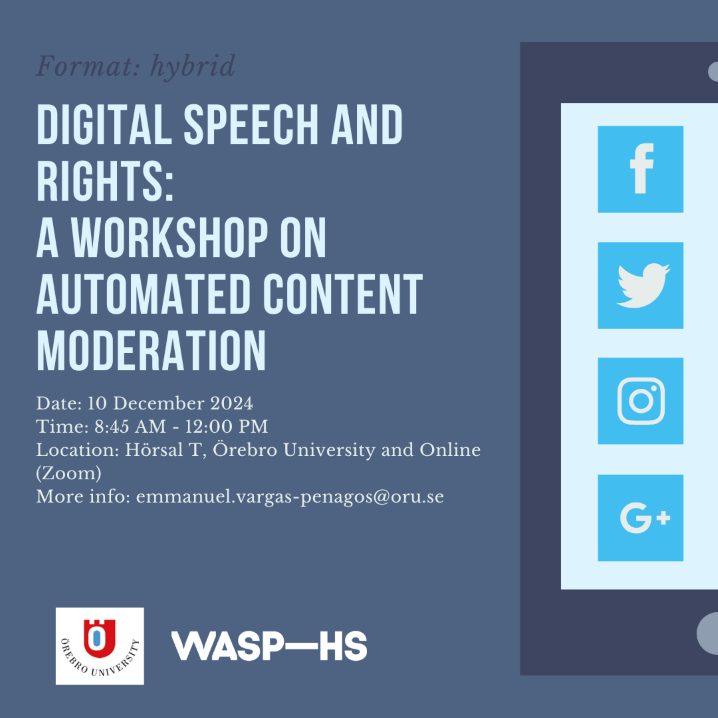Digital Speech and Rights: A workshop on automated content moderation
10 december 2024 08:15 – 12:00 Hörsal T, Örebro University and Online

Workshop-format lecture within the course on Law and Digital Technologies
During the last two decades, the growing amount, scale and scope of content posted by users of social media platforms has exacerbated concerns in relation to the impact of people’s speech on the rights of others, including among those privacy, reputation and non-discrimination. At the same time, social media platforms have garnered significant power and turned into private rulemakers and enforcers of norms impacting the exercise of human rights in the digital sphere, a role in which the use of automated tools has played a key role. However, those tools have shown limitations that sometimes result in over-blocking of legitimate content online, or over-allowance of content that may be detrimental to the rights of others. NGOs, human rights bodies, academics and legislators have increasingly called for platforms to incorporate human rights standards in their process for moderating content. At EU level, the most recent and potentially impactful legal development with that aim has been the Digital Services Act, adopted in 2022 and entered into force in February 2024.
Against this background and within the course on Law and Digital Technologies at Örebro University, this workshop-format lecture will bring leading scholars working on pressing issues related to automated content moderation. This Workshop forms part of the research project “Private Rule-making and European Governance of AI & Robotics” at Örebro University, funded by The Wallenberg AI, Autonomous Systems and Software Program Humanities and Society (WASP-HS).
Guests:
Therese Enarsson: docent in law at the Department of Law at Umeå University. In her research she has over the recent years focused on fundamental rights in different legal contexts, such as the protection of victims online, hate speech and content moderation, with a focus on protecting and balancing free speech and other rights. Her research spans over many legal fields such as criminal law and constitutional law, and she has also published interdisciplinary research in the social media context.
Joan Barata Mir: PhD in Law, he works on freedom of expression, media regulation, and intermediary liability issues. He is a Senior Fellow at The Future of Free Speech. He is also a Fellow of the Program on Platform Regulation at the Stanford Cyber Policy Center. He has published a large number of articles and books on these subjects, both in academic and popular press. His work has taken him in most regions of the world, and he is regularly involved in projects with international organizations such as UNESCO, the Council of Europe, the Organization of American States or the Organization for Security and Cooperation in Europe, where he was the principal advisor to the Representative on Media Freedom. Joan Barata also has experience as a regulator, as he held the position of Secretary General of the Audiovisual Council of Catalonia in Spain and was member of the Permanent Secretariat of the Mediterranean Network of Regulatory Authorities.
Jacob van de Kerkhof: PhD researcher at the Montaigne Centre for Rule of Law and Administration of Justice at Utrecht University, the Netherlands. His research focuses on fundamental rights and the Digital Services Act.
Chair:
Emmanuel Vargas Penagos: PhD researcher in Law at Örebro University, focusing on the Human Rights implications of automated content moderation and course responsible for the course Law and Digital Technologies. A lawyer from Los Andes University with an LLM in Information Law from the University of Amsterdam, his research spans freedom of expression, privacy, and AI. He has worked with organizations like UNESCO, Media Defence, and the Inter-American Commission on Human Rights, and founded El Veinte, a Colombian NGO for freedom of expression.
